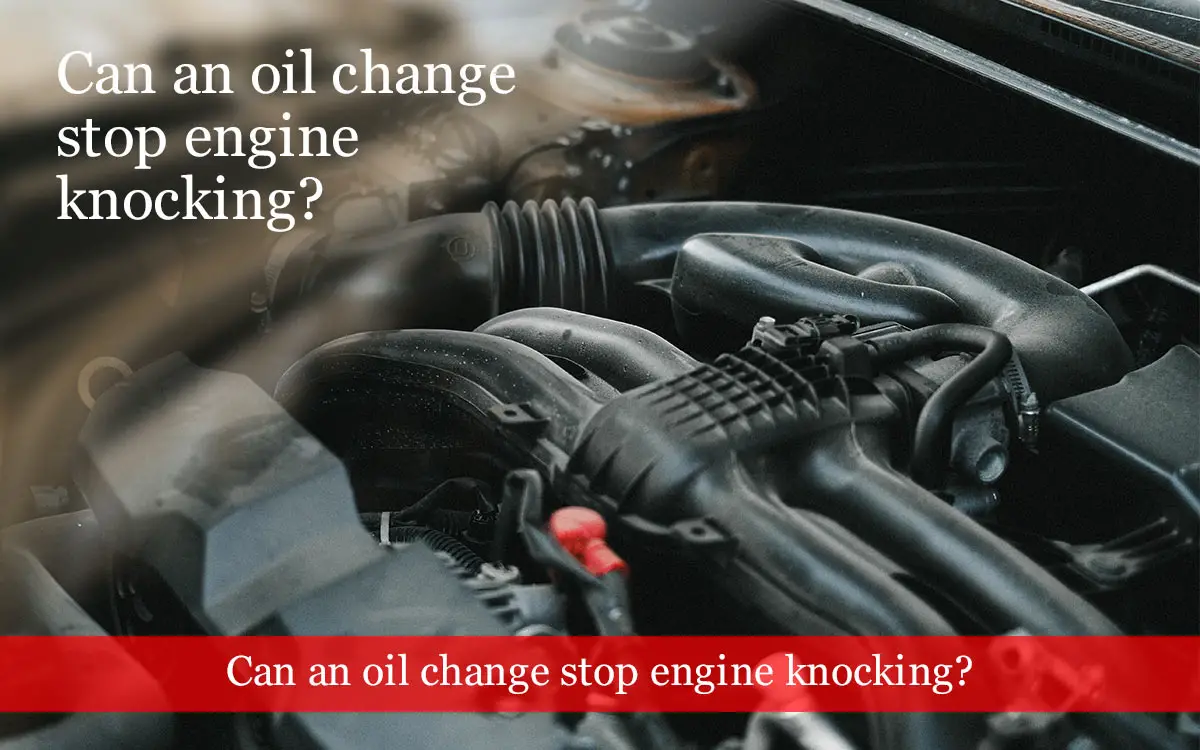Knock, knock. Who’s there? It’s not a joke, but rather the dreaded sound that sends shivers down the spines of car owners everywhere including me – engine knocking. Is there anything more unsettling than hearing those ominous thuds coming from under the hood of your car?
Many car enthusiasts and mechanics swear by the power of fresh oil to put an end to the nerve-wracking knocking symphony. But is it really the cure-all solution we’ve been led to believe, or just another wild goose chase in the never-ending quest to keep our engines purring like content kittens?
Join us to explore the age-old question: Can an oil change stop an engine from knocking?
The answer is No, replacing your engine oil isn’t going to fix a knock that is caused by internal engine problems. In fact, it can even make things worse if the issue is not actually related to oil quality or level. When there is a knocking sound in your engine, it simply means that your engine is struggling to operate smoothly. The noise is an indication that there’s something wrong with your engine, and simply changing the oil isn’t going to magically fix it.
That being said, regular oil changes are still an essential part of maintaining a healthy engine. It helps keep the engine lubricated and functioning properly, reducing wear and tear on its moving parts. Fresh oil also contains additives that can help clean and protect the engine, keeping it running smoothly for longer. It’s crucial to follow your car manufacturer’s recommended oil change schedule to ensure optimal performance and longevity of your engine.
However, before you start panicking and throwing your hard-earned money at multiple oil changes in an attempt to cure your engine knock, it’s important to diagnose the root cause of the problem.
Keep Reading to Find Out About the Causes of Engine Knocking
Causes of Knocking Sound in Your Engine
A knocking sound can be caused by a variety of issues such as:
- Failing Oil Pump
- Worn Bearing
- Insufficient Lubrication
Let’s explore these in detail.
1. Failing Oil Pump
The first suspect when it comes to engine knocking is often the oil pump. This component is responsible for circulating oil throughout the engine, ensuring all moving parts are properly lubricated. If the oil pump fails, there won’t be enough oil circulating in the engine, leading to metal-on-metal contact and resulting in a knocking sound.
A failing oil pump is mostly caused as a result of normal wear and tear over time, but it can also be due to a clogged oil filter or low oil levels. To prevent this issue, make sure to regularly check your oil levels and replace the oil filter as recommended by your car manufacturer.
2. Worn Bearing
Bearing is another crucial component in an engine that helps reduce friction between moving parts. Over time, bearings can wear out due to continuous use and lack of proper lubrication, leading to a knocking sound. This issue is especially common in older cars with high mileage.
To prevent worn bearings, make sure to stick to your recommended oil change schedule and use high-quality oil that contains additives for engine protection.
3. Insufficient Lubrication
Lastly, Insufficient lubrication is another cause of your engine knocking. Insufficient lubrication can be caused by many factors, including low oil levels, using the wrong type of oil, or a faulty oil pump. Without proper lubrication, the moving parts in your engine will grind against each other and create a knocking sound.
To prevent this issue, make sure to regularly check your oil levels and use the type of oil recommended by your car manufacturer. Also, keep up with routine maintenance such as oil changes and replacing worn-out components like the oil pump.
Proper lubrication is essential for keeping your engine running smoothly and preventing knocking noises. So, it’s important to pay attention to any changes in sound coming from your engine and address them promptly to avoid potentially costly repairs in the future.
What Should You Do if You Hear a Knocking Sound Coming from Your Engine?
- The best course of action is to take your car to a trusted mechanic for a thorough inspection. They will be able to diagnose the issue and provide you with the necessary repairs or maintenance recommendations.
- In addition, it’s important to follow the recommended maintenance schedule for your vehicle and address any potential issues as soon as they arise. This will not only help prevent knocking sounds but also keep your car running smoothly and potentially save you money in the long run.
- Keep in mind that the engine isn’t the only potential source of knocking noises in your vehicle. Loose or worn suspension components, damaged exhaust systems, and faulty wheel bearings can also cause similar sounds. Regularly inspecting these areas and addressing any issues promptly can help.
How to Properly Maintain Your Car Engine
Car engines are the heart of your vehicle and require regular maintenance to keep them running smoothly. Here are a few essential steps to properly maintain your car’s engine:
- Check the oil regularly.
- Replace the oil and filter.
- Keep your engine clean.
- Follow the recommended maintenance schedule from the manufacturer.
- Pay attention to any unusual noises or warning lights.
1. Check Oil Levels Regularly
The first step in maintaining your car’s engine is to check the oil levels regularly. This should be done at least once a month or before long road trips. To do this, locate the oil dipstick under the hood of your car and pull it out. Wipe it clean with a cloth or paper towel and reinsert it. Then, pull it out again and check the level. If it’s below the minimum line, you need to add more oil.
I would also advise you to follow your vehicle’s manual for the recommended type and grade of oil to use. This will ensure that your engine is properly lubricated and running efficiently.
2. Replace Oil and Filter
Over time, oil breaks down and becomes less effective at protecting your engine. That’s why it’s important to replace both the oil and oil filter regularly. The general rule is to change your oil every 5,000 kilometers or every 3 months, whichever comes first.
The oil filter should also be replaced during an oil change. This is because the filter traps any dirt and debris in the oil, preventing it from damaging your engine. A clogged filter can restrict flow and cause damage to your engine over time.
3. Keep Your Engine Clean
A clean engine not only looks good, but it also runs better. Dirt and debris can build up in your engine over time, causing it to run less efficiently. To keep your engine clean, you can use a degreaser or engine cleaner specifically designed for cars. Be sure to follow the instructions on the product carefully.
It’s also important to regularly clean any dirt or debris from the air intake and vents. This will prevent any build-up that could affect the performance of your engine.
4. Listen to Your Engine
Your car’s engine can often give you signs when something is not right. These include strange noises, vibrations or a decrease in power. If you notice any of these symptoms, it’s important to have your engine checked by a mechanic as soon as possible. Ignoring these signs could lead to more serious and costly issues down the road.
5. Regular Maintenance
Preventative maintenance is key to keeping your engine running smoothly. This includes regular tune-ups, checking and replacing belts and hoses, and inspecting all fluid levels. It’s also important to follow your vehicle’s recommended maintenance schedule for things like spark plug replacements and timing belt changes. By keeping up with regular maintenance, you can avoid costly repairs and ensure your engine stays in top condition.
Final Thoughts
Your car’s engine is a complex piece of machinery that requires proper care to keep it running smoothly. By following these tips and staying on top of regular maintenance, you can extend the life of your engine and keep your car performing at its best.
A well-maintained engine not only saves you money and time but also ensures your safety on the road. So listen to your engine and take care of it, and it will take care of you.
I hope this article has provided you with valuable information on how to care for your car’s engine. Remember, prevention is always better than cure when it comes to maintaining your vehicle.

